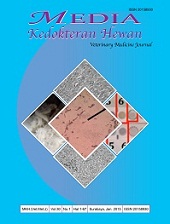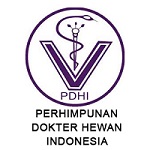Ergothioneine Modulates Biomarkers of Oxidative Stress, Biochemical Profiles and Rectal Temperatures of Arabian Stallions Following Exercise in A Hot-Humid Environment
Downloads
These experiments were performed to determine the effect of ergothioneine (EGT) and environmental parameters on some physiological profiles of Arabian stallions following an 1800 m race in a hot-humid environment. Twelve stallions having a mean weight of 401 ± 7.33 kg and aged 5.28 ± 1.14 years were used as subjects. They were divided into two groups of treated stallions (n = 6) and untreated stallions (n = 6). Group I which was the experimental group was administered with EGT (0.5 mg/kg orally)every week for two months while group II which served as controls was not treated. The temperature and the relative humidity of the experimental site were determined for six days and on the day of the experiment. The temperature-humidity index (THI) was also calculated. Vital parameters and some biochemical parameters of all stallions were determined before the commencement, immediately after, and one hour after the exercise. Some biomarkers of oxidative stress and serum biochemical parameters (aspartate aminotransferase, creatinine and lactate dehydrogenase) of the stallions were also determined.The biochemical parameters were higher (P < 0.05) in the untreated group than in the treated group. The results obtained showed that EGT lowered the rectal temperature and modulated biomarkers of oxidative stress and biochemical profiles.
Adah, A.S, Adah, D.A, Nwonuma, C.O, and Aiyedun, J.O. (2020). Modulatory effects of melatonin on erythrocyte indices in Arabian stallions following a 30-km sub-maximal exercise. Comparative Clinical Pathology. 29:921-926.
Aubert, A.E., Seps, B. and Beckers, F. (2003). Heart rate variability in athletes.; Sports Medicine. 33:889–919.
Ayala, A, Munoz, M.F. and Argüelles, S. (2014). Lipid peroxidation: production, metabolism, and signaling mechanisms of malondialdehyde. Oxidative Medicine and Celllar Longevity, doi: 10.1155/2014/3604
Bashir, A. and Rasedee, A. (2009). Plasma catecholamine, sweat electrolytes and physiological responses of exercised normal, partial, anhidrotic and anhidrotic horses.; American Journal Animal and Veterinary Science 4(1):26-31.
Cheah, I.K., et al. (2016). Liver ergothioneine accumulation in a guinea pig model of non-alcoholic fatty liver disease. A possible mechanism of defence? Free Radical Research, 50(1):14-25.
Cheah IK, et al. (2017). Administration of pure ergothioneine to healthy human subjects: uptake, metabolism, and effects on biomarkers of oxidative damage and inflammation. Antioxidant and Redox Signaling 26(5):193-206.
CIGR (1984). Report of Working Group of Climatization of Animal Houses, Scottish Farm Buildings Investigation Unit, Craibstone, Bucksburn, Aberdeen, AB2 9TR, Scotland for Commission Internationale du Genie Rural (International Commission of Agricultural Engineering).
Cottin, F., Barrey, E., Lopes, P. and Billat, V.L. (2006). Effect of fatigue during five successive heats (800 m at high velocity) and recovery runs on heart rate variability in Standardbred. Proceeding of the 7th International Conference on Equine Exercise Physiology, Fontainebleau, France,; pp: 68.
Courouce A., et al. Comparison of some responses to exercise on the track and the treadmill in French trotters: determination of the optimal treadmill incline. 2000 Jan; Vet J. 159: 57–63.
Evans, D.L. and Rose, R.J. (1988). Cardiovascular and respiratory responses in thoroughbred horses during treadmill exercise. Journal of Experimental Biology.; 134: 397-408.
Franklin, S.H., Van Erck-Westergren, E., and Bayly, W.M. (2012). Respiratory responses to exercise in the horse. Equine Veterinary Journal. 44:726-732.
Geor, R.J., McCutcheon, L.J. (1998). Thermoregulatory adaptations associated with training and heat acclimation. Veterinary Clinics of North America-Equine. 14:97-120.
Gerard, M. P. et al. (2014) Energetic considerations of exercise. In: D.R. Hodgson, McKeever K.H. and McGowan C.M. (Eds). The athletic horse, principles and practice of equine sports medicine 2. ed. USA: Elsevier Saunders; p 19-33
Grigat S. et al (2007). Probing the substrate specificity of the EGT transporter with methimazole, hercynine, and organic cations. Biochemical Pharmacology, 74:309–316.
Halliwell, B., Cheah, I.K. and Tang, R.M.Y. (2018). EGT a diet-derived antioxidant with therapeutic Potential. FEBS Letters; 592: 3357–3366
Hanzawa, K., et al (2002) Effect of exercise on plasma haptoglobin composition in control and splenectomized Thoroughbred horses. Journal of Equine Science 13(3): 89-92.
Harris, P.A., Marlin, D.J. and Gray, J. (1998). Plasma aspartate aminotransferase and creatine kinase activities in thoroughbred racehorses in relation to age, sex, exercise and training Veterinary Journal 155(3): 295-304.
Harris, R.C. et al. (1991). Muscle ATP loss and lactate accumulation at different work intensities in exercising Thoroughbred horse. European Journal of Applied Physiology 62: 235-244.
Hartmann, E., et al (2015). 24-h sheltering behaviour of individually kept horses during Swedish summer weather. 2015 Aug; Acta Veterinaria Scandinavia 57: 45-54.
Hodgson, D.R., McKeever, K.H. and McGowan, C.M. (2014). The Athletic Horse: Principles and Practice of Equine Sports Medicine. 2nd Ed. Elsevier Saunders, China p 497.
Hodgson, D.R., Davis, R.E. and McConaghy, E.F. (1994). Thermoregulation in the horse in response to exercise. British Veterinary Journal. 150: 219-234.
Hodgson, D.R., et al (1993). Dissipation of metabolic heat in the horse during exercise. Journal of Applied Physiology 74:1161-1170.
Joseph, M.R. et al. Exercising in a hot environment with muscle damage: effects on acute kidney injury biomarkers and kidney function. 2013; American Journal of Physiology: Renal Physiology 305: F813–F820.
Kenneth, W.H., et al (2004). Equine Sports Medicine and Surgery: Basic and Clinical Sciences of the Equine Athlete; 4: 697-728.
Kerley, R.N., et al (2018). The potential therapeutic effects of ergothioneine in pre-eclampsia. Free Radical Biology and Medicine. 117:45–157
Khoubnasabjafari, M., Ansarin, K. and Jouyban, A. (2015). Reliability of malondialdehyde as a biomarker of oxidative stress in psychological disorders. BioImpacts.5(3): 123–127.
Kohn, C.W., Hinchcliff, K.W. and Mckeevert, K.H. (1999). Effect of ambient temperature and humidity on pulmonary artery temperature of exercising horses. Equine Veterinary Journal 30:404-41
Lai, L., et al. (2016). Exercise inducible lactate dehydrogenase B regulates mitochondrial function in skeletal muscle. Journal of Biological Chemistry 291(49):25306–25318.
Lawan, A., et al (2010). Effects of race distance on physical, hematological and biochemical parameters of endurance horses. American Journal of Animal and Veterinary Science 5(4): 244-248.
Mader, T.L., Davis, M.S. and Brown-Brandl, T. (2006). Environmental factors influencing heat stress in feedlot cattle. Journal of Animal Science, 84: 712–719.
Marone, P.A., Trampota, J. and Weisman, S. (2016). A safety evaluation of a nature-identical L-ergothioneine in Sprague-Dawley rats. International Journal of Toxicology; 35(5): 568-583
Marques, M.S., et al (2002). Influence of physical exercise on plasma lactate and serum cortisol in race horses (in Portuguese). A Hora Veterinaria. 2002; 22: 29–32.
Martin, B.B., et al (2000). Causes of poor performance of horses during training, racing, or showing: 348 cases (1992-1996). Journal of American Veterinary Medical Association. 216: 554-558.
McMiken, D.F. (1983). An energetic basis of equine performance. Equine Veterinary Journal 15: 123-133
Morgan, K. (1998). Thermoneutral zone and critical temperatures of horses. Journal of Thermal Biology 23(1): 59-61.
Morris, E.A. and Seeherman, H.J. (1991). Clinical evaluation of poor performance in the race horse: the results of 275 evaluations. Equine Veterinary Journal 23: 169-174.
Nakamura, T, et al (2008). Functional characterization of EGT transport by rat organic cation/carnitine transporter OCTN1 (SLC22A4). Biology and Pharmaceutical Bulletin 31:1580–1584
Nardone, A., et al (2010) Effects of climate changes on animal production and sustainability of livestock systems. Livestock Science; 130(1-3): 57-69
Nienaber, J.A., Hahn, G.L. and Eigenberg, R.A. (1999). Quantifying livestock responses for heat stress management: a review. International Journal of Biometeorology. 42:183-188.
Noordhuizen, J. and Noordhuizen, T. (2017). Heat Stress in (Sport) Horses: (I) Occurrence, Signs and Diagnosis, (II) Practical Management and Preventive Measures. Journal of Dairy and Veterinary Science. 2017; 2(5): 1-5.
Padilla L, et al (2006). Heat stress decreases plasma vitamin C concentration in lactating cows. Livestock. Science. 101(1-3): 300-304.
Paul, B.D. and Snyder, S.H. (2009). The unusual amino acid L-ergothioneine is a physiologic cytoprotectant. Cell Death Differentiation 17: 1-7.
Rensis, F.D. and Scaramuzzi, R.J. (2003). Heat stress and seasonal effects on reproduction in the dairy cow-a review. Theriogenology, 60(6): 1139- 1151.
Repine, J.D. and Elkins, N.D. (2012). Effect of ergothioneine on acute lung injury and inflammation in cytokine insufflated rats. Preventive Medicine 54(Suppl): S79–S82.
Richard, EA., et al (2009). Sub-clinical diseases affecting performance in Standardbred trotters: diagnostic methods and predictive parameters. Veterinary Journal, 184: 282-289.
Schmidt, A., et al (2010). Changes in cortisol release and heart rate and heart rate variability during the initial training of 3-year-old sport horses. Hormone and Behaviour. 58: 628–636.
Schrama, J.W., et al. (1996). Required thermal thresholds during transport of animals. Veterinary Quarterly, 18(3):90-95
Tamai, I., et al. (1997). Cloning and characterization of a novel human pH-dependent organic cation transporter, OCTN1. FEBS Letters 419: 107–111.
Tang, R.M., et al (2018). Distribution and accumulation of dietary ergothioneine and its metabolites in mouse tissues. Scientific Reports 8: 1601-1615
Verdegaal, E.J.M.M. and Franklin, S.H. (2015). Science in brief: Highlights from the applied physiology, muscle and genetics abstracts at the International Conference on Equine Exercise Physiology, Equine Veterinary Journal.; 48(1): 9-12.
Wallsten, H., Olsson, K., Dahlborn, K. (2012). Temperature regulation in horses during exercise and recovery in a cool environment. Acta Veterinaria. Scandinavia. 54:42-47.
Williams, C.A. (2016). The effect of oxidative stress during exercise in the horse. Journal of Animal Science 94:4067–4075.
Yoshida, S., et al (2017). The Antioxidant ergothioneine augments the immunomodulatory function of TLR agonists by direct action on macrophages. PLoS ONE 12(1): e0169360.
Younus, H. (2018). Therapeutic potentials of superoxide dismutase. International Journal of Health Science (Qassim) 12(3): 88–93.
Copyright (c) 2022 Adakole Adah, Joseph Ayo, Peter Rekwot, Tagang Aluwong, Deborah Adah

This work is licensed under a Creative Commons Attribution-ShareAlike 4.0 International License.

Veterinary Medicine Journal by Unair is licensed under a Creative Commons Attribution-ShareAlike 4.0 International License.
1. The Journal allows the author to hold the copyright of the article without restrictions.
2. The Journal allows the author(s) to retain publishing rights without restrictions
3. The legal formal aspect of journal publication accessibility refers to Creative Commons Attribution Share-Alike (CC BY-SA).





11.jpg)







11.png)













